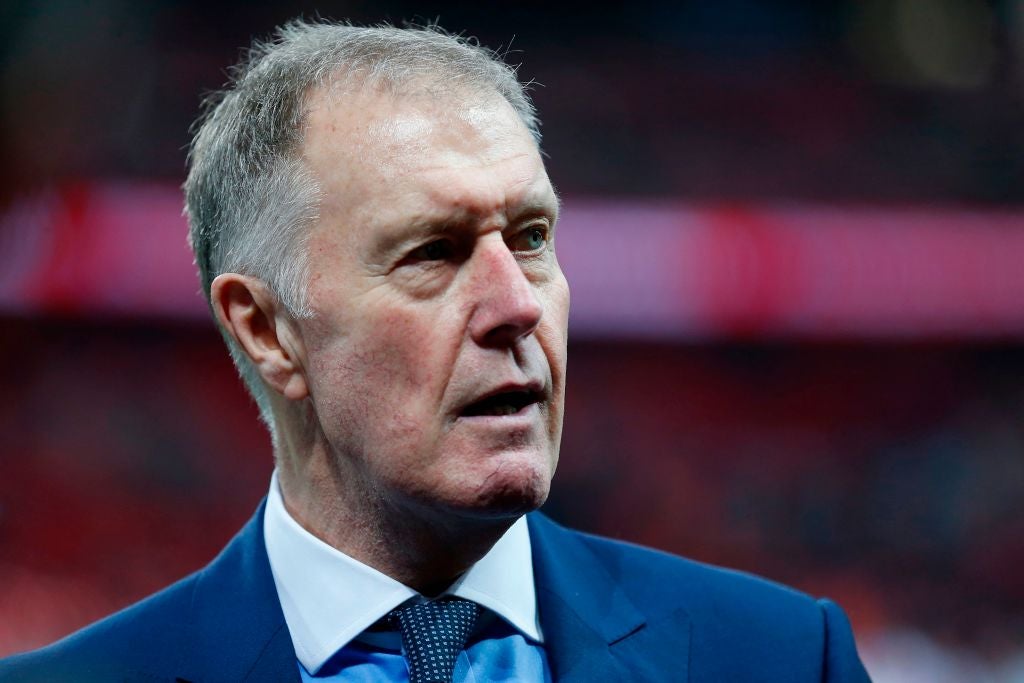Your support helps us to tell the story
From reproductive rights to climate change to Big Tech, The Independent is on the ground when the story is developing. Whether it's investigating the financials of Elon Musk's pro-Trump PAC or producing our latest documentary, 'The A Word', which shines a light on the American women fighting for reproductive rights, we know how important it is to parse out the facts from the messaging.
At such a critical moment in US history, we need reporters on the ground. Your donation allows us to keep sending journalists to speak to both sides of the story.
The Independent is trusted by Americans across the entire political spectrum. And unlike many other quality news outlets, we choose not to lock Americans out of our reporting and analysis with paywalls. We believe quality journalism should be available to everyone, paid for by those who can afford it.
Your support makes all the difference.Sir Geoff Hurst admits the alarming number of former England team-mates afflicted by dementia has led to his own fears of suffering with the illness.
World Cup winners Ray Wilson, Martin Peters, Jack Charlton and Nobby Stiles have died with the neurological disease during the past three years, while Sir Bobby Charlton has recently been diagnosed.
Hurst is bidding to raise funds for the Alzheimer's Society by leading a campaign to have the entire 1966 World Cup final - in which he memorably scored a hat-trick - transformed into colour for the first time.
READ MORE: Premier League fixtures and table - all matches by date and kick-off time
The 78-year-old previously viewed life in older age as pot luck but has become deeply concerned by growing links between football and dementia.
"Prior to all of this happening, I've always felt that when you get to this sort of age life is always a bit of a lottery," Hurst told the PA news agency.
"That has always been my genuine honest feeling of how I felt of people living to this age.
"But more recently when there has been a lot more focus on it and so many players in my team, it does cross your mind to an extent that it could happen (to me).
"It's not something that, up until more recently, I focused on at all. I just felt life's a lottery and you get what comes, it could be anything.
"More research is needed, quite frankly, between the links between heading footballs and dementia.
"But I've also felt - without any science knowledge - that it seemed to be a high proportion of people in my immediate team, compared with the guy in the street."
Wilson's demise in May 2018 was followed by the deaths of Hurst's close friend Peters last December, Jack Charlton in July, and Stiles in October.
The FIELD study published last year found footballers were three and a half times more likely to die of neurodegenerative disease than members of the population of a similar age.
Hurst, who remains fit and well, recently said he would be willing to donate his brain to science in order to aid research into the issue.
He is troubled by football's current treatment of head injuries, citing Sunday evening's serious collision between Arsenal defender David Luiz and Wolves striker Raul Jimenez as an example.
"We saw David Luiz, a nasty clash, bandages his head and goes back on the field and I read he drives himself home," Hurst said.
"It's up to clubs within the sport industry to get together and start looking very closely at these issues.
"If a tough player wants to get back on the field after a head injury, then the medical people need to say, 'No, you're coming off, that's it'."
Former West Ham and Stoke striker Hurst hopes his latest project - a crowdfunding venture titled £fullcolour66 - will aid investigation into dementia by contributing around £35,000 to the Alzheimer's Society.
Football fans can pay to watch a colour version of England's 4-2 extra-time win over West Germany at Wembley, which will be released on the 55th anniversary of the game on July 30 next year.
In addition to generating valuable charity funds, Hurst believes the project will be a fitting tribute to the players who contributed to the success.
"It's one of the greatest sporting moments we've had in this country ever," he said.
"It's the world's number one sport, it's our country's number one sport, it's the only time we have achieved it and it's disappointing that the actual match is in black and white.
"It doesn't do the game justice in many respects. And also it doesn't do justice to the individual players who played, some of the greats we have lost recently.
"To pay homage to some of the great players, great characters – [Gordon] Banks, [Bobby] Moore, [Bobby] Charlton, [Jimmy] Greaves, Nobby Stiles, Ray Wilson, Martin [Peters] – it would be great for them."
PA




Join our commenting forum
Join thought-provoking conversations, follow other Independent readers and see their replies
Comments